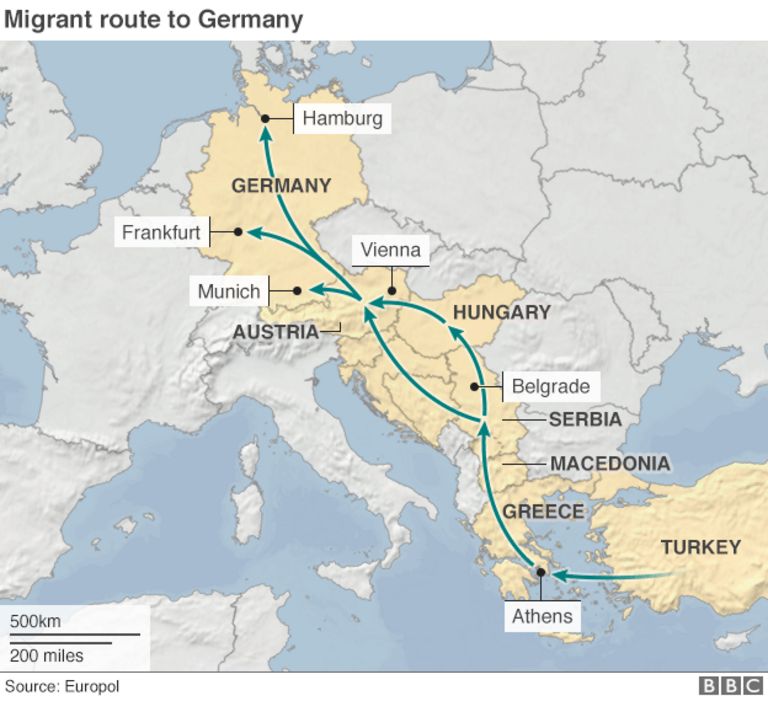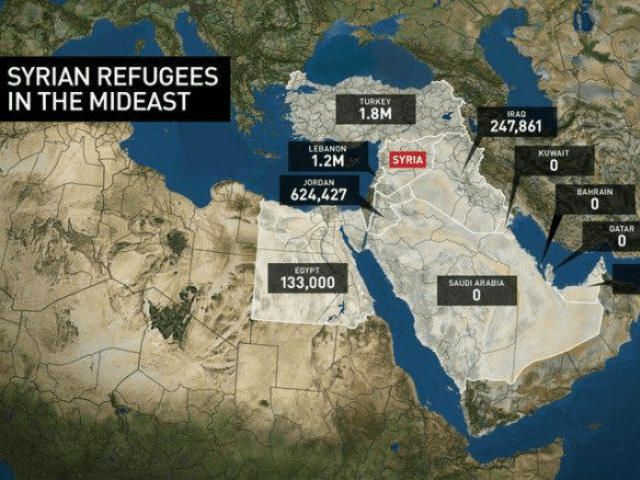June 26,2015
Europe migrant crisis: How are countries coping?
By Laurence Peter
BBC News
26 June 2015
From the section Europe
A migrant holds a placard reading "We are not going back" as he waits near the sea, in the city of Ventimiglia at the French-Italian border, on 15 June 2015
Many migrants were blocked earlier in June at the French-Italian border
Europe's migration crisis affects EU member states in different ways - so it is proving difficult to agree on common rules.
The influx of migrants into southern Europe has escalated, driven by the wars in Syria and Iraq, as well as conflict in many parts of Africa. More than 150,000 have arrived this year - far more than in the first half of last year.
The EU is struggling with shifting migration patterns, creating particular problems for individual countries. How are they coping?
Italy
For months Italy has been on the frontline of the crisis, as boatloads of desperate migrants risk their lives trying to reach Lampedusa or Sicily.
Last year Italy controversially reduced its naval patrols off war-torn Libya, telling its EU partners that they must contribute to efforts to stop the migrant boats coming.
After hundreds of migrants drowned off Lampedusa this year, the EU agreed to launch a joint naval operation to rescue migrants in distress. But aid agencies say patrols ought to cover a wide area on the high seas - not just the EU's territorial waters.
Italy says its EU partners must also share the burden of housing migrants and processing asylum claims.
Prime Minister Matteo Renzi voiced anger at East European leaders who rejected an EU plan for mandatory quotas to distribute migrants across the 28-nation bloc.
Recently France blocked hundreds of migrants at Ventimiglia, on the Italian border.
Many migrants staying at makeshift camps in Italy are desperate to move on to northern Europe.
Greece
The boatloads of migrants heading for Greek islands have increased sharply this year.
Lesvos is a particular pressure point. Many of the migrants are Syrians, and many of them will be entitled to refugee status, having fled the civil war.
But Greece's reception centres are overcrowded and some are in a deplorable state.
Heavily indebted Greece, already unable to pay its bills, cannot cope with the influx. It has a massive backlog of asylum claims to process.
There is much hostility in Greece towards non-EU migrants, and many of them quickly try to move north via the Balkans to reach other EU countries.
In the current economic crisis many Greeks fear competition from foreigners for scarce jobs.
France
In recent years France has sent many poor Roma (Gypsies) back to Romania and Bulgaria, after they entered France illegally.
But now the French focus is on the growing numbers of migrants entering Europe from the Mediterranean. They include many sub-Saharan Africans, some of whom have camped out on the streets of Paris.
The latest pressure point is Calais, where about 3,000 irregular migrants are sleeping rough, getting little local help. They want to get to the UK - and pictures of them jumping on to UK-bound lorries triggered fresh British criticism of lax security at the French port.
France says the UK must provide more help to solve the Calais crisis.
Migration into Europe
153,000
migrants crossed into Europe so far this year
149% increase from 2014
63,000 migrants reached Greece by sea
62,000 migrants reached Italy by sea
10,000 on Hungary/Serbia border in May
UK
The UK's emphasis is on breaking up the people-smuggling networks - trying to tackle the problem before the migrants turn up in Europe.
UK politicians point out that the UK spends more than many other EU countries on development aid, which can help stem the flow of economic migrants from poor countries.
The UK and some other EU countries also want stronger EU efforts to send failed asylum seekers back. Last year the rate for sending migrants back was just 39%.
But the British debate has tended to focus on the Conservatives' ambition to reduce immigration from EU countries. The government wants to tighten the rules on migrants' social benefits, as a disincentive for would-be immigrants from the EU.
The UK is involved in the Mediterranean naval operation, but has opted out of the EU plan to relocate 40,000 asylum seekers from overcrowded migrant centres in Italy and Greece.
Germany
Germany has more asylum seekers than any other EU country. Its strong economy is a magnet for migrants desperate to start a new life.
But like other EU countries, Germany wants much better screening of migrants, to determine who has the skills that the German economy needs.
The birth rate in Germany, as in Italy, is low - so both countries will need immigrants to fill labour market gaps in future.
Germany has a tradition of welcoming migrants - after all, Turks, Yugoslavs and some other nationalities contributed greatly to Germany's post-war economic boom.
Germany and Austria support the EU plan for resettling asylum seekers. That contrasts with the reluctance of most East European countries to take in more migrants.
Germany has been the preferred destination of many Chechens, who fled Russia's bloody crackdown against separatist fighters.
Partly the East Europeans are worried that they could see an influx from Ukraine, where fighting continues between government troops and pro-Russian rebels.
But apart from Hungary and Bulgaria, the other eastern countries have relatively low rates of immigration.
Hungary
Tensions have risen between Hungary and neighbouring Austria recently, since Hungary announced that it would not take back migrants who had moved elsewhere in the EU.
Hungary now says it is a temporary measure, because of a sudden influx - not a violation of the EU's Dublin Regulation. That rule says the country where a migrant first arrives is responsible for handling the migrant's asylum claim.
This year Hungary has experienced a surge of migrants trying to enter from Serbia. It has announced plans to fence off the Serbian border.
Many of Hungary's recent immigrants are escaping dire poverty in Kosovo, and many of their asylum claims are likely to be rejected.
Hungary and Bulgaria are exempt from the new EU plan to relocate asylum-seekers across the EU.
Bulgaria, like Hungary, says it cannot cope with any more, as its reception centres are overcrowded.
---------------------------------------------------------July 9, 2015
[url[http://www.macleans.ca/news/world/amid-europes-immigration-crisis-julian-assange-asks-for-asylum/
Amid an immigration crisis, Julian Assange asks for asylum
Leah McLaren on how WikiLeaks founder Julian Assange’s plea for protection in France couldn’t have come at a worse time
Leah McLaren
July 9, 2015
Stefan Wermuth/Reuters
Of all the desperate migrants seeking asylum in Europe last week in the hope of a better life, Julian Assange was perhaps the least sympathetic.
In a summer that’s seen thousands of migrants drowning in the Mediterranean off the shores of Italy and Greece, and, more recently, storming the Calais tunnel for passage into the U.K., Assange’s open letter to President François Hollande, printed last week in Le Monde, hit a distinctly off note. The Australian WikiLeaks founder has been living in the Ecuadorian Embassy in London since 2012, when prosecutors in Sweden announced they wanted to question him for alleged sex crimes, including rape, sexual molestation and illegal coercion.
Assange denies the allegations (no formal charges have been made) and says the European warrant for his arrest is, in fact, part of an extensive plot by American authorities to have him extradited to the U.S., where he could be tried for treason. In his letter to Hollande, Assange stated that his life was in danger, and that,“by welcoming me, France would carry out a humanitarian and symbolic gesture, sending encouragement to every journalist and whistleblower.”
According to the letter, his request was prompted by an invitation to visit France from a group of French civil rights activists backed by French Justice Minister Christiane Taubira. In June, Taubira told French news channel BFMTV that she “absolutely would not be surprised” if France granted asylum to both Assange and National Security Agency (NSA) whistleblower Edward Snowden, currently living in Russia. She added that it would be a “symbolic gesture,” in part motivated by the NSA’s sweeping surveillance of three French presidents.
Yet Assange’s plea was not well-received at the highest levels of French government. The French president’s office responded immediately with an unequivocal smackdown. “The situation of Mr. Assange does not present any immediate danger,” the statement read. “Furthermore, he is subject to a European arrest warrant.”
In a head-scratching (and hair-splitting) turn of events, Assange’s legal team responded by saying that he hadn’t actually made any request at all. Baltasar Garzón, the head of his defence team, told the British media that Assange’s letter had not been a request for asylum, but an expression of his willingness “to be hosted in France if, and only if, an initiative was taken by the competent authorities.”
But reading the letter, it seems awfully clear that Assange was hoping for the same protection once extended to that other high-profile accused rapist, the American director Roman Polanski. Assange describes himself as a “journalist pursued and threatened with death by the United States authorities” (though he does not give evidence of the alleged death threats). He links the claim to the 2010 WikiLeaks release of a classified video leak by the soldier Chelsea Manning (a male-to-female transsexual then-named Bradley). The video showed a series of ground-to-air strikes by American forces against unarmed Iraqis that ended up killing 18 civilians, including two Reuters journalists. (In 2013, Manning was charged and convicted of offences under the U.S. Espionage Act and sentenced to 35 years in prison.)
In an extra twist, in his open letter, Assange added that his youngest child, whom he hasn’t seen in five years (and whose sex he will not specify), lives in France with the child’s mother. “I have had to keep their existence secret up to today, in order to protect them,” he wrote. Assange has long been rumoured by tabloids to have fathered several children around the world. According to the book WikiLeaks: Inside Julian Assange’s War on Secrecy by Guardian journalists Luke Harding and David Leigh, Assange was enamoured with the idea of impregnating the many women he slept with, and balked at the idea of contraception.
According to the European arrest warrant, he is accused of raping a 26-year-old Swedish woman whom he “improperly exploited” because she, “due to sleep, was in a helpless state.” According to Swedish statutes of limitation, prosecutors only have until August to question Assange about the crimes of which he’s accused. But they also have until 2020 to investigate the most serious allegation of rape.
He remains in the Ecuadorian Embassy, but has said he is planning to leave “soon.” Two members of London’s metropolitan police force are continually on guard outside the Embassy, in case he decides to do so. Earlier this year, Scotland Yard confirmed that policing Assange has so far cost the British taxpayers almost $20 million.
RELATED STORIES
Why refugees are fleeing France for Britain
Migrants queue to receive their daily food distribution in a makeshift camp known as the "jungle", in Calais, northern France, Thursday, June 25, 2015. Migrants from Sudan, Eritrea and elsewhere are camped by the thousand in the port city of Calais trying to reach Britain, where they believe they will have better job prospects.
Upload photo
Would you look at a profile that doesn't have photos?
Probably not! Upload a photo for others to be interested.
- Higher position in search results!
- Users with pictures get 10 times more responses in their messages
- Most people only contact those with pictures
Jenny
Lina
Anna
Jessica
Dony







/cdn0.vox-cdn.com/uploads/chorus_asset/file/4030254/2000px-syria15.png)





